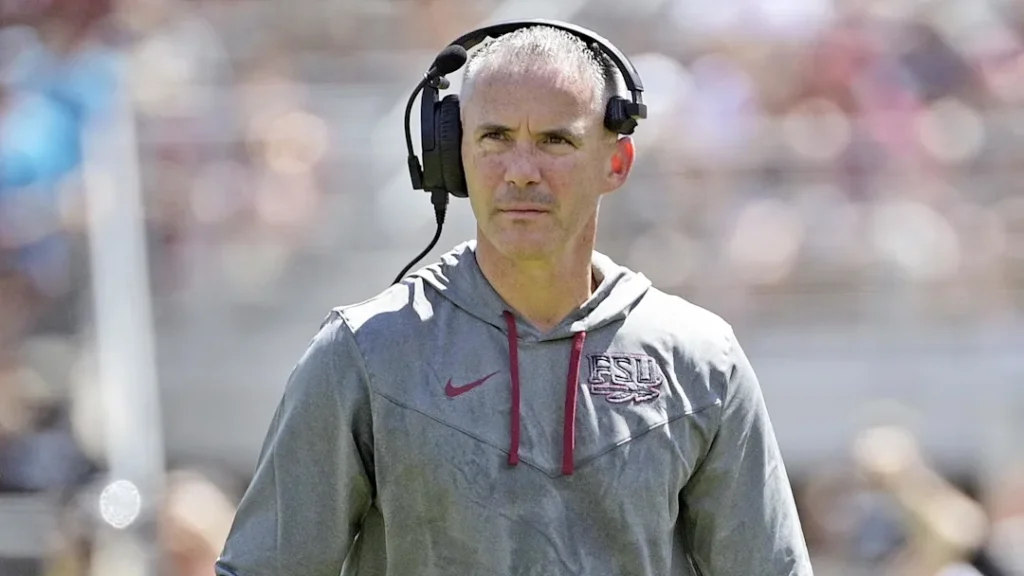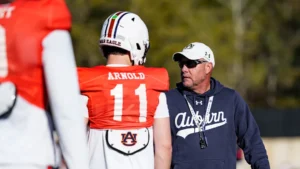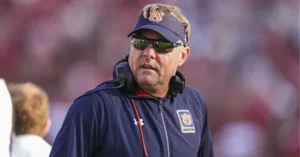
Against Alabama, FSU football has a dismal kickoff time.
A clash with Alabama — one of college football’s premier powerhouses — should be headline material. It should be the kind of game that defines a season, a program, even a recruiting cycle. But instead of prime-time glory and national spotlight, FSU and its fans have been dealt a bitter blow: an unceremoniously early kickoff time.
According to the recently released 2025 schedule, Florida State’s marquee non-conference matchup against Alabama is set for a 11 a.m. Central Time (noon Eastern) kickoff. In a sport where atmosphere, preparation, and visibility matter immensely, this is a gut punch. And for a Seminoles program trying to reassert itself as a national brand, it’s downright disheartening.
On paper, this game is everything a college football fan could want. Two blue-blood programs. Storied histories. Deep recruiting ties. National title aspirations. NFL-bound talent on both sidelines. Yet the timing of this clash dulls what could have been a true spectacle.
For Florida State, this game isn’t just about early-season momentum — it’s a litmus test. After a 2024 season marred by playoff snubs and late-season letdowns, the Seminoles are desperate to return to the sport’s upper echelon. Beating Alabama — or even showing they can go toe-to-toe with the SEC’s finest — would provide that validation. But starting before lunchtime could alter the trajectory of the game in subtle yet significant ways.
College football isn’t the NFL. In the NFL, early starts are a weekly occurrence and part of the league’s rigid broadcast ecosystem. In college football, early kickoffs tend to feel like afterthoughts — the games networks care about less, the ones relegated to filler slots before the primetime juggernauts take over.
And for the players? It’s brutal.
For a noon Eastern kickoff, teams are typically up at 6:00 a.m. or earlier. Their pregame meals happen when most students are still asleep. Warmups begin before most fans have even parked their cars. And if you’re playing on the road — as Florida State will be — it’s even worse.
Against a team like Alabama, every detail matters. Early kickoffs eliminate the time players have to shake off nerves, settle into routines, and prepare mentally for the stakes. It’s no coincidence that many of college football’s biggest upsets happen in early games — those hours are simply not optimal for peak performance.
Historically, early road kickoffs have not been kind to Florida State.
While the program has made gains in recent years under Mike Norvell, the ‘Noles still show signs of vulnerability in games that start before 3 p.m., especially when playing outside of Doak Campbell Stadium. In 2023, FSU nearly stumbled against Boston College during a noon road kickoff, escaping with a narrow 31-29 win after blowing a 21-point lead. The sluggish second half was blamed in part on travel fatigue and inconsistent energy levels — both of which will be magnified against Alabama.
And then there’s the fan impact.
A game of this magnitude deserves the full college football experience — tailgating, pregame shows, sold-out stadiums brimming with anticipation. But by starting at 11 a.m. local time in Tuscaloosa, the matchup loses its edge.
Fans will have just enough time to gulp down a quick breakfast before heading to the gates. Night-before tailgates will be short-lived or non-existent. College GameDay — should it choose to attend — would be fighting the clock just to deliver its usual energy.
Even for television audiences, the noon Eastern slot is tough. Most casual viewers tune in later in the afternoon, when the biggest games typically kick off. In a year where playoff spots may come down to razor-thin margins — and where strength of schedule and media buzz factor heavily — a less-watched, early game could diminish the long-term impact of an FSU win.
While Alabama also has to rise early, it gets the distinct advantage of being at home.
No travel. No body-clock changes. No 5:00 a.m. wakeups in a hotel far from campus.
Under Kalen DeBoer, the Crimson Tide are adapting to a new era, but they still benefit from the kind of home-field support and system infrastructure that makes early kickoffs less of a hurdle. And let’s be honest — Alabama doesn’t get many noon kickoffs unless the matchup is seen as second-tier.
That this game was chosen for a noon slot says more about how the networks — and maybe even the SEC — view Florida State than Alabama.
Let’s not ignore the politics behind kickoff times. ESPN and ABC — which share rights to both the SEC and ACC — make strategic decisions about when games are played. But as of 2024, the SEC has its own dedicated 3:30 p.m. and primetime TV windows through ESPN’s multibillion-dollar deal.
That means FSU, an ACC member, doesn’t carry the same broadcast weight as an SEC team. Even in a top-tier matchup, the Seminoles are more likely to be shifted into earlier slots. It’s a reality that underscores why FSU and other programs like Clemson have publicly flirted with leaving the ACC altogether.
In a different world — say, if FSU were in the SEC — this game likely kicks off under the lights.
In modern college football, perception drives recruiting. NIL deals, transfer portal interest, and blue-chip commitments often hinge on how often a program is visible — and how competitive they look against top-tier opponents.
A night game against Alabama would’ve attracted elite recruits from all over the Southeast. Instead, many of those recruits will be saving their visits for later in the day when other programs — Georgia, Texas, Ohio State — kick off in primetime.
FSU can’t afford to be a noon team. Not if it wants to challenge the SEC stranglehold on talent acquisition. Not if it wants to prove it’s a viable landing spot for the next wave of five-star prospects.
More broadly, college football loses when games like this are pushed to early windows. Rivalries, non-conference clashes, and traditional powers facing off should be celebrated with prime placement — not shuffled to avoid overlapping with SEC matchups or Notre Dame’s NBC contract.
If the sport truly wants parity and expanded playoff drama, then it needs to treat high-stakes games outside the SEC with equal reverence. FSU-Alabama is, by any definition, a top-10 caliber battle. That it’s being kicked off before brunch ends is a disservice to everyone involved.
Despite the frustrating kickoff time, the Seminoles still control their destiny.
If they march into Tuscaloosa and dominate, the win will resonate — no matter the time. A strong start can vault FSU into the playoff picture and restore some of the lost luster. But it won’t be easy, and the margin for error will shrink in the thin air of a sleepy, mid-morning start.
Mike Norvell has proven he can motivate his team under challenging circumstances. But this one will require his best effort yet. Managing energy, travel schedules, hydration, and mental focus will be key. One bad quarter — especially the first — could spell doom.
The game between Florida State and Alabama should be an event. Instead, it’s been reduced to a scheduling casualty — a product of media rights and power-conference politics. And for FSU, a program on the rise but still seeking full national validation, the 11 a.m. local kickoff feels like another roadblock on an already difficult climb.
There’s no such thing as a meaningless game in college football. But there are games that deserve better treatment. This one does. The fans do. The players do.
And if FSU pulls off the upset, the timing won’t matter — but the fact they had to fight through it will only make the win sweeter.





